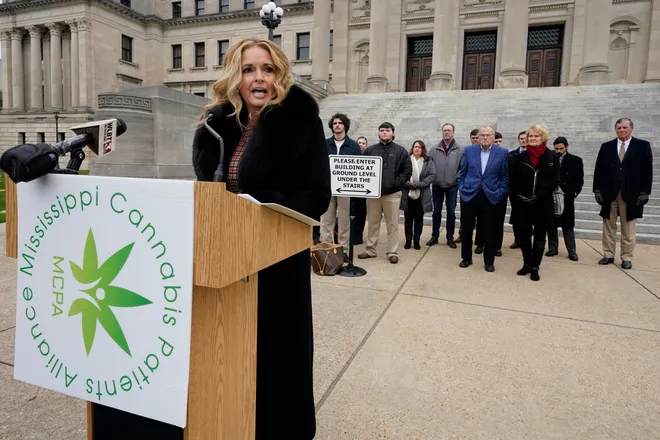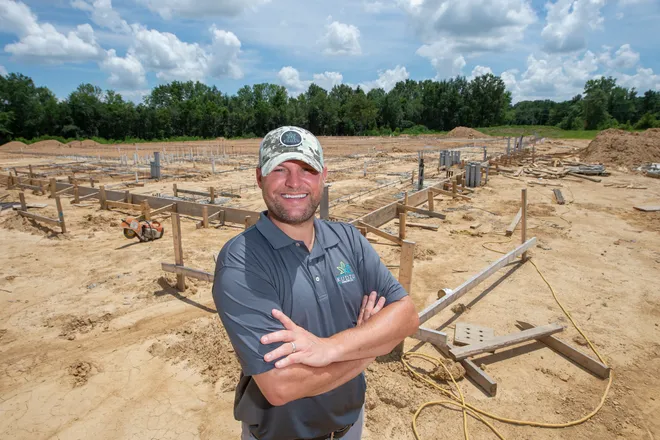After years of legislative and legal delays, Mississippi’s medical marijuana industry is slowly taking shape.
Since June 1, a small number of medical providers, patients and businesses have been approved as the Mississippi State Department of Health continues to process applications.
For entrepreneurs such as Jared Kobs, the co-founder of Kudzu Cannabis, which received its cultivation license in early July, this allows the company to work toward having products available by the end of the year.
It is also the culmination of years of work. His team started working on their cultivation, processing, and distribution site in Canton in 2021.
The company also applied for processing and transportation licenses and three dispensary licenses in July.
“We were told they would need extra time on those licenses, and we should hear back on the dispensary licenses within 30 days. They are getting stuff done,” Kobs said.
Medical marijuana:Launch of medical marijuana in Mississippi could bring ‘cultural change in the southeast’
License:Here is how to get a Medical marijuana license
Mockingbird Cannabis is also among the companies that have been approved for cultivation and processing licenses. The company’s facility is located in Hinds County. Clint Patterson, the CEO of Mockingbird, said they plan for their first harvest to take place in October and will have a limited number of products available this fall.
The company has also applied for a research license, which is currently on hold. Eventually, the company wants to be at the forefront of research and development to understand the health benefits of cannabis better, he said.
“Because it has been illegal for so long, research has been limited. I think the state could lead in this area. Through a coalition of the universities, the department of health, and companies — we could lend this data some legitimacy and improve our understanding of the health benefits,” he said.
The Department State Department of Health oversees licensing for most medical marijuana-related businesses. Since June 1, the DOH has issued 16 business licenses. Those include specific licenses for cultivators and processors. Additionally, they have issued 36 applications for medical providers and 25 for patients. These were the latest numbers available as of July 28.
Research:Marijuana research center opens at the University of Mississippi
Applications for dispensary licenses have been far more competitive so far, said Ken Newburger, with the Mississippi Medical Marijuana Association. There are specific zoning requirements for those businesses. They must be at least 1,500 feet away from each other. They are also required to be 1,000 feet away from churches and schools.
The department of revenue received well over 100 applications for dispensaries within an hour of opening its portal in early July, although the numbers have slowed since then, Newburger said.
He expects the approved number of businesses to pick up over the next few months and said that the department of health has been “actively working with people to get licenses.”
He is also anticipating that the number of patients approved for medical marijuana cards will increase as products become available early next year.
“Patients don’t feel the urgency because there is no product,” Newburger said. “I believe (medical marijuana) cards won’t be active until the product is on the shelf. I expect that we will continue watching the business license count go up, followed by patient counts leading to the sale of medical cannabis.”
Angie Calhoun, the founder of the Mississippi Cannabis Patients Alliance, encourages members to wait until October to apply for their medical marijuana cards. They have to get recertified within 12 months by a physician.
“As soon as they let dispensaries open, patients will be notified that their cards are active and can start using them,” she said. “There is no real reason to be in a super big hurry at this time.”

Tia Beasley has been hired as a physician assistant at Pause Pain & Wellness, a new clinic that focuses on medical marijuana to treat chronic pain. She said she has worked in a variety of areas of medicine, including primary care and obstetrics — and worried about patients when they ran out of treatment options.
“This presented a new avenue of care for patients. My goal is to help make an impact on the opioid crisis,” Beasley said.

